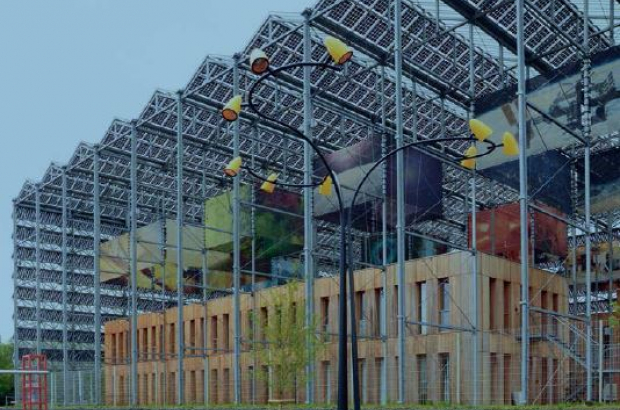- Daily & Weekly newsletters
- Buy & download The Bulletin
- Comment on our articles
From the Ardennes to outer space
Wallonia’s Space Valley received the royal seal of approval when King Philippe and Queen Mathilde visited the Galaxia business centre in the Ardennes town of Transinne at the end of last year.
It was a timely visit: just a few weeks later, ground was officially broken at the site as construction began on a new tracking station for Europe’s Galileo satellite programme. By the end of this summer, the new Galileo Integrated Logistics Support Centre will be up and running, helping ensure that the sophisticated satellite data system operates smoothly from any point around the planet.
This is just the latest development in a business scheme aimed at clustering space technologies in Wallonia in the Galaxia business park. Construction is moving at a steady pace, according to Fabian Collard, CEO of Idelux, the Luxembourg province’s economic development agency that is responsible for building Galaxia. “We started the works in October last year, and our schedule is for 300 working days of construction, which means the end of August,” he says. “We will give the keys to the operator at start of September.”
Even the winter weather barely slowed the project. “We had a couple of weeks where we had to suspend work because of frost, but then we worked two shifts and managed to catch up on the delay,” Collard says.
The Galileo system currently has 18 satellites in orbit. Last December, after 17 years of development, it went live with early operational capability. Aiming to supply the world’s most accurate satellite navigation technology, officials hope the system will eventually provide greater location accuracy than either the US or Russian military services. They say Galileo will boost geo-location precision tenfold, to within one metre compared to the current US-controlled Global Positioning System (GPS), which is accurate only to within several metres. It is expected to reach full operational capability in 2019, and the complete 30-satellite Galileo system – with 24 operational and six active spares – is expected by 2020.
One of the keys to this ambitious project is its logistics centre at Galaxia. The 2,300m² building currently under construction ensures that all the Galileo ground stations can communicate with the satellites, providing effective maintenance and repair work and the managing supplies for all the programme’s key sites. The Wallonia region is financing the €8.6 million Galileo logistics building, which should generate about 30 jobs, while boosting local companies working in the field of satellites and on-board equipment. These include Thales, Samtech, Amos, Spacebel and Ateliers de la Meuse, some of which are already subcontractors for the Ariane rocket programme.
The 30-hectare Galaxia site already hosts a centre to nurture entrepreneurs with novel spin-off ideas for the wealth of technologies and systems developed under Europe’s space programmes. The venture, Business Incubation Centre Redu, has been set up with the European Space Agency (ESA).
It provides an array of business support resources and services, and will promote more activities including cyber-security and microsatellites. The centre aims to promote investment in space programmes and make an impact in the broadest possible way: not only through science, telecommunications, navigation and other benefits to Europe’s citizens, but also by creating enterprises and jobs at a local level. The aim is to support and encourage the spin-off from space technology research and development activities.
The entire Galaxia site in Transinne is linked by optical fibres to ESA’s former Redu Centre, 4km away. Built in 1968, it hosts 43 steerable antennas and is responsible for controlling and testing satellites as part of ESA’s ground station network.
There are further plans to refurbish the Euro Space Centre, the science museum and educational centre, introducing visitors to spaceflight, the planets and the stars, as well as running space adventure camps and space classes for schools. Collard says the planned €10 million revamp will overhaul the building, and turn the focus more to European rather than American space activities.
Collard says Galaxia reflects the new image of Wallonia: once dominated by coal and steel, the region is now showcasing cutting-edge technologies, from space to web services, and biotechnology to aerospace.
Belgium is one of the world’s leading countries in devoting GDP resources to space. And last year, Libin, where Galaxia is based, was named Wallonia’s top district for business by Trends-Tendance magazine. “Walloon companies have a good reputation, and this project is a great example,” Collard says. “We think positively, and Galaxia really helps Wallonia build an image of the future.”
This article first appeared in WAB (Wallonia and Brussels) magazine














